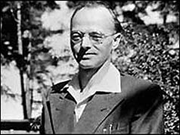 |
| Klaus Fuchs was a
devoted Communist |
|
1950: Communist spy jailed for 14
years |
Artificially 1969:
The A top nuclear
scientist has been jailed for fourteen years at the Old Bailey for spying
for the Soviet Union.
Klaus Emil Julius Fuchs, 38, a civil servant from Harwell in Berkshire,
pleaded guilty to four offences under the Official Secrets Act.
German-born Fuchs, who fled his home country to escape Nazi persecution
in 1933, had come to be regarded as one of Britain's top atomic
scientists.
But beneath the facade was a committed Communist who had been passing
secrets to the Russians for most of the past decade.
He was convicted on four counts of disclosing atom secrets "calculated
to be directly or indirectly useful to an enemy" - in England in 1943 and
1947 and in the United States in 1944 and 1945.
The Attorney General, Sir Hartley Shawcross KC, who opened the case for
the prosecution, said Fuchs had undoubtedly passed information to the
Soviets on many more than four occasions even though he was on trial for
four specific offences.
His motivation, said Mr Shawcross, was his "unswerving devotion to
Communism".
Fuchs, who until his arrest last month was employed as senior principal
scientific officer at the Harwell Atomic Research Establishment, arrived
in Britain from Germany, via France, in 1933.
When France was invaded by the Germans in 1940, Fuchs was interned and
deported to Canada.
He was released in 1942 and was head-hunted by Birmingham University to
carry out atomic research.
It was at this stage he made contact with the Soviets and began
regularly passing information relating to atomic energy, the court was
told.
Between 1944 and 1946 he worked in the American Atomic Research
department in Los Alamos, New Mexico, where he was involved in the
construction of the first atomic bomb.
The court was told that it was information from the Americans which
first led British detectives to suspect Fuchs of espionage .
Defending, Mr Derek Curtis-Bennett, KC, said it was at about this time
that his client had started "having doubts about the Russian policy" and
began to "see the light".
He added the first three offences had in fact been committed when
Russia was an ally of Britain and therefore information passed could not
have been regarded as prejudicial to the interests of the state.
Passing sentence, Lord Chief Justice Lord Goddard said: "You have
betrayed the hospitality and protection given to you by this country with
the grossest treachery."